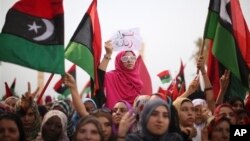Libya’s top religious authority, the grand mufti, is stirring up controversy with a call for strict gender segregation in all workplaces, classrooms and government offices.
The nation’s human rights groups are warning the mufti’s call, if heeded, will likely encourage Islamic vigilantes who have been pressing for gender segregation and who patrol the streets looking for women they say are immodestly clothed or unaccompanied by a male relative.
In an open letter last week addressed to the country’s leaders, Sheikh Sadiq Al-Ghariani warned that unless gender segregation was imposed, Libya risked incurring the wrath of Allah.
Ghariani said he had received complaints about “the deterioration of morals and the widespread phenomena of the free mixing between sexes, with no restrictions or regulations, in all state institutions.” He said such mixing of the sexes was “immoral” and called on authorities to end it, warning otherwise there would be a spread of “immoral havens.”
Last year, Ghariani criticized the government for including passages about democracy and freedom of religion in new school textbooks issued since the fall of Col. Moammar Gadhafi.
Libyan activists outraged
The mufti’s latest call for gender segregation has prompted outrage from liberal activists in Libya.
“Mecca is not segregated and our Haj (pilgrimage) is not segregated,” says Dr. Farida Allaghi, a veteran human rights campaigner.
She worries that religious conservatives are determined to reduce the personal liberty of women and are trying to impose strictly interpreted Islamic Sharia law as the sole source of the country’s post-Gadhafi constitution.
“Fortunately, more and more we have fantastic Muslim scholars who understand what rights women have been given by Islam, and how like every other right, men are dominating and interpreting to fit their own agendas,” Allaghi said. “It is sad to see this progressive religion that gives great rights for women being misinterpreted.”
The grand mufti is Libya’s highest-ranking religious scholar and heads the Fatwa office (the Dar Al-Ifta) in the government that issues religious rulings about what is forbidden or permitted under Islam. The office’s rulings do not have the force of law, but can be influential, especially on political Islamists in the country’s General National Congress and in government.
Special priority for Islamic values
Ghariani insists that most Libyans want “special priority to be given to Islamic moral values in a manner that would preserve the nation’s Islamic identity and faith.”
Earlier this year, Ghariani urged lawmakers to make it illegal for Libyan women to marry foreigners – even foreign Muslims. And in March, he issued a toughly worded fatwa against the U.N. Commission on the Status of Women because of a report calling for greater action by governments to protect women from violence and gender discrimination.
The fatwa said the principles underpinning the U.N. report are “unjust and destructive” and clash with the Koran. It also accused the U.N. group of undermining the family structure as well as advocating immorality and indecency.
According to Ghariani’s open letter last week, “it is a well known fact that frequent mixing [of women] with men at the place of work and at schools/universities for long hours, makes it rather impossible for one to lower his/her gaze and protect ones chastity.” He also warned of “increased reports of illegal abortions and operations of the restoring of virginity in and outside the country out of fear of shame.”
A devoutly Sunni Muslim country where religious observance underpins every social norm, Libya has been struggling with its Arab Spring transition to democracy.
Struggling with transition
Rebel leaders appointed Sheikh Sadeq al-Ghariani grand mufti during the uprising against Col. Gadhafi. He had held the post under Gadhafi as well.
Ghariani became a critic of Gadhafi as the rebellion gained momentum. When the Libyan despot was captured and slain last October, Ghariani ruled Gadhafi an "infidel” and unworthy of prayers.
While devout, most Libyans describe themselves as middle-of-the-road moderates. In last July’s elections, candidates running under the Islamist Muslim Brotherhood were defeated by those running under a moderate coalition led by Mahmoud Jibril, a former Gaddafi-era planning minister.
But since the elections there have been signs of a conservative upsurge as frustrations build over the slow pace of improvement in the lives of ordinary Libyans.
In February, Libya’s Supreme Court overturned a Gadhafi-era marriage law requiring a husband to secure the approval of his first wife before taking a second. The Gadhafi-era law stipulated that if the first wife refused, a husband had to go to court to seek permission to marry further wives.
Ghariani supported the Supreme Court’s ruling, arguing that the Koran sanctions polygamy and that a man should not have to ask his first wife because of a woman's "jealous nature."
Libya’s reformers have become increasingly frustrated with what they see as the mufti’s meddling in politics. But he is popular with a large percentage of the population. A weekly TV talk show he hosts commands a large audience and his Facebook Page with more than 70,000 followers is one of the most popular of Libyan public figures.
The nation’s human rights groups are warning the mufti’s call, if heeded, will likely encourage Islamic vigilantes who have been pressing for gender segregation and who patrol the streets looking for women they say are immodestly clothed or unaccompanied by a male relative.
In an open letter last week addressed to the country’s leaders, Sheikh Sadiq Al-Ghariani warned that unless gender segregation was imposed, Libya risked incurring the wrath of Allah.
Ghariani said he had received complaints about “the deterioration of morals and the widespread phenomena of the free mixing between sexes, with no restrictions or regulations, in all state institutions.” He said such mixing of the sexes was “immoral” and called on authorities to end it, warning otherwise there would be a spread of “immoral havens.”
Last year, Ghariani criticized the government for including passages about democracy and freedom of religion in new school textbooks issued since the fall of Col. Moammar Gadhafi.
Libyan activists outraged
The mufti’s latest call for gender segregation has prompted outrage from liberal activists in Libya.
“Mecca is not segregated and our Haj (pilgrimage) is not segregated,” says Dr. Farida Allaghi, a veteran human rights campaigner.
She worries that religious conservatives are determined to reduce the personal liberty of women and are trying to impose strictly interpreted Islamic Sharia law as the sole source of the country’s post-Gadhafi constitution.
“Fortunately, more and more we have fantastic Muslim scholars who understand what rights women have been given by Islam, and how like every other right, men are dominating and interpreting to fit their own agendas,” Allaghi said. “It is sad to see this progressive religion that gives great rights for women being misinterpreted.”
The grand mufti is Libya’s highest-ranking religious scholar and heads the Fatwa office (the Dar Al-Ifta) in the government that issues religious rulings about what is forbidden or permitted under Islam. The office’s rulings do not have the force of law, but can be influential, especially on political Islamists in the country’s General National Congress and in government.
Special priority for Islamic values
Ghariani insists that most Libyans want “special priority to be given to Islamic moral values in a manner that would preserve the nation’s Islamic identity and faith.”
Earlier this year, Ghariani urged lawmakers to make it illegal for Libyan women to marry foreigners – even foreign Muslims. And in March, he issued a toughly worded fatwa against the U.N. Commission on the Status of Women because of a report calling for greater action by governments to protect women from violence and gender discrimination.
The fatwa said the principles underpinning the U.N. report are “unjust and destructive” and clash with the Koran. It also accused the U.N. group of undermining the family structure as well as advocating immorality and indecency.
According to Ghariani’s open letter last week, “it is a well known fact that frequent mixing [of women] with men at the place of work and at schools/universities for long hours, makes it rather impossible for one to lower his/her gaze and protect ones chastity.” He also warned of “increased reports of illegal abortions and operations of the restoring of virginity in and outside the country out of fear of shame.”
A devoutly Sunni Muslim country where religious observance underpins every social norm, Libya has been struggling with its Arab Spring transition to democracy.
Struggling with transition
Rebel leaders appointed Sheikh Sadeq al-Ghariani grand mufti during the uprising against Col. Gadhafi. He had held the post under Gadhafi as well.
Ghariani became a critic of Gadhafi as the rebellion gained momentum. When the Libyan despot was captured and slain last October, Ghariani ruled Gadhafi an "infidel” and unworthy of prayers.
While devout, most Libyans describe themselves as middle-of-the-road moderates. In last July’s elections, candidates running under the Islamist Muslim Brotherhood were defeated by those running under a moderate coalition led by Mahmoud Jibril, a former Gaddafi-era planning minister.
But since the elections there have been signs of a conservative upsurge as frustrations build over the slow pace of improvement in the lives of ordinary Libyans.
In February, Libya’s Supreme Court overturned a Gadhafi-era marriage law requiring a husband to secure the approval of his first wife before taking a second. The Gadhafi-era law stipulated that if the first wife refused, a husband had to go to court to seek permission to marry further wives.
Ghariani supported the Supreme Court’s ruling, arguing that the Koran sanctions polygamy and that a man should not have to ask his first wife because of a woman's "jealous nature."
Libya’s reformers have become increasingly frustrated with what they see as the mufti’s meddling in politics. But he is popular with a large percentage of the population. A weekly TV talk show he hosts commands a large audience and his Facebook Page with more than 70,000 followers is one of the most popular of Libyan public figures.












